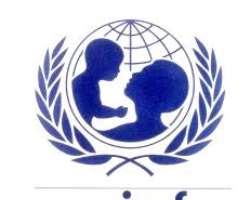BOSG to Vaccinate 1.2 Million IDPs Against Yellow Fever With Support From WHO , UNICEF

WHO, UNICEF and other partners are supporting the Borno State Ministry of Health to vaccinate more than 1.2 million internally displaced persons (IDPs) across 57 wards in 25 Local Government Areas in Borno State.
So far, more than 3,000 WHO-trained volunteers, including senior supervisors, monitors, healthcare workers and community leaders, will immunize 1.2 million IDPs aged from 9 months to 45 years at designated health facilities.
The campaign had began on 5 February and is expected to continue until 14 February.
To ensure vaccine availability and uptake, UNICEF supported the Borno State Government with logistics for vaccine distribution and social mobilization.
Through the deployment of over 2,000 community volunteers and key influencers, UNICEF enhanced community engagement for yellow fever preventive vaccination and ensured that community is aware of the campaign and yellow fever risks.
“If we miss out on children of Borno, often living in very difficult conditions, we deprive large number of children of lifesaving vaccines. It is not only their right but our collective duty to ensure that they survive and thrive,” said Mohammed Fall, UNICEF Nigeria Representative.
To ensure a high-quality campaign, WHO worked with the Borno State Ministry of Health to coordinate and facilitate the training of healthcare workers at all levels, arrange logistics for vaccine distribution and deliver messages on health risks to communities.
“Although Borno State has not reported an outbreak of yellow fever this year, vaccinating internally displaced persons is an exercise of high public health importance to protect most-at-risk populations living in high-risk conditions and prevent the spread of yellow fever, if an outbreak occurs,” said Dr. Wondimagegnehu Alemu, WHO Nigeria Representative.
The Borno State Honourable Commissioner for Health, Dr. Haruna Mshelia, emphasized the importance of vaccinating IDPs in camps and host communities.
“The vulnerable living conditions of millions of people in Borno State and the tide of outbreaks across 16 States in Nigeria makes it imperative to target the most at-risk people with yellow fever vaccination in the State.”
These efforts are part of a larger yellow fever vaccination campaign that seeks to vaccinate more than 25 million people throughout 2018, in the largest yellow fever vaccination drive in Nigeria’s history.
This fits into a wider public health health goal to eliminate yellow fever epidemics globally by 2026 through the Eliminate Yellow fever Epidemics (EYE) Strategy, steered by WHO, Gavi and UNICEF.
It will be recalled that Yellow fever is a vaccine-preventable acute viral haemorrhagic disease transmitted by infected mosquitoes and the current yellow fever outbreak in Nigeria began in Kwara State in September 2017.
By early January 2018, a total of 358 suspected cases had been reported in 16 states, with 45 deaths.
World Health Organization (WHO) is building a better future for people everywhere. Health lays the foundation for vibrant and productive communities, stronger economies, safer nations and a better world.
As the lead health authority within the United Nations (UN) system, we help to ensure the safety of the air we breathe, the food we eat, the water we drink and the medicines and vaccines that treat and protect us. The Organization aims to provide every child, woman and man with the best chance to lead a healthier, longer life.
While UNICEF promotes the rights and wellbeing of every child, in everything we do. Together, with our partners, we work in 190 countries and territories to translate that commitment into practical action, focusing special effort on reaching the most vulnerable and excluded children, to the benefit of all children, everywhere.
